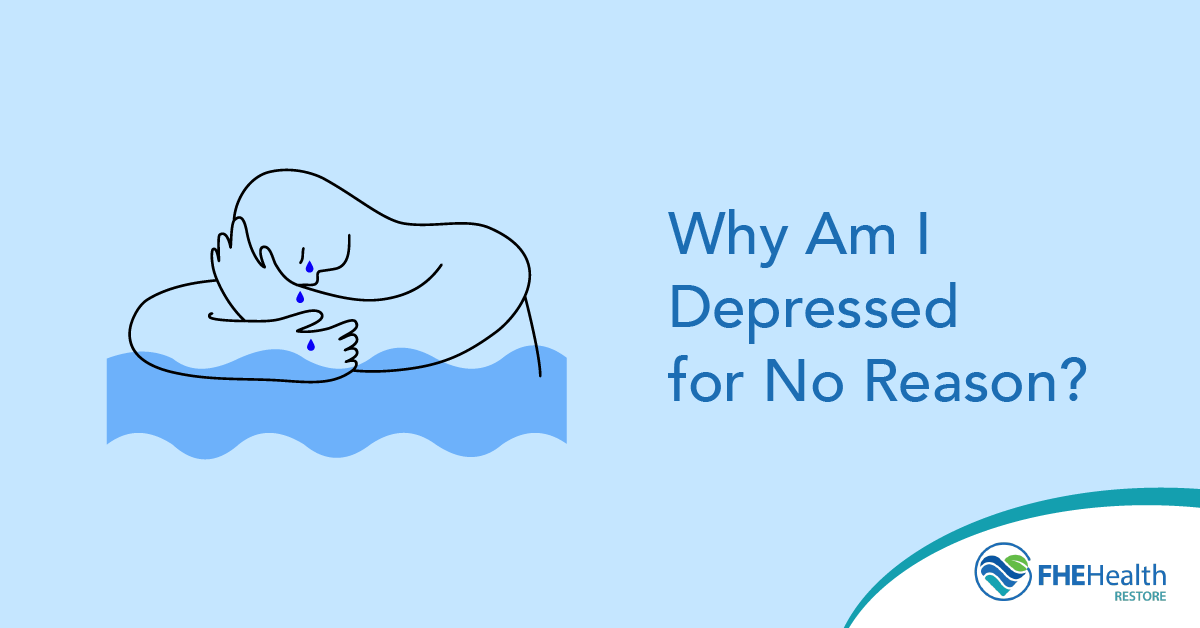Depression is a mental health condition that affects people everywhere. Often, people think that if they’re depressed without a reason, what they’re feeling isn’t “real depression.” The truth is, depression often occurs without a clear cause. Just because there isn’t an obvious reason, it doesn’t make the symptoms of depression any less real.
This guide explores some reasons a person may fall into depression without a cause and discusses the different kinds of depression and when it’s important to seek advice.
Understanding Hidden or Subtle Triggers for Depression
Depression affects about 4.8% of the population in the United States, and it can be caused by many things. A stressful life event is a common trigger. For example, a divorce, bereavement or even job loss can cause a person to feel depressed.
However, depression doesn’t always have an obvious cause. Some individuals are genetically predisposed to depression, while others experience depression because of a hormonal imbalance or other biological factor. Fortunately, treatments are available to help a person overcome depression and return to a normal life.
Biological and Genetic Factors That May Play a Role
Biological and genetic factors that can lead to depression include:
- Pregnancy and childbirth. Antenatal depression can occur during pregnancy due to hormonal changes. Another common issue is postnatal depression, which occurs after childbirth and is thought to be caused by the combination of hormonal changes, the physical challenges associated with giving birth and the stresses related to life as a new parent.
- Menopause. Women going through menopause may experience low mood or severe mood swings, resulting in symptoms similar to depression.
- Drug or alcohol abuse. Drinking alcohol on a regular basis can increase the risk of developing depression. Certain drugs, such as cannabis, may also bring on depression in those genetically predisposed to the condition.
- Chronic pain. People living with chronic pain or experiencing a life-threatening illness may develop depression as a result.
- Hypothyroidism. Fatigue and weight gain are the most well-known symptoms of an underactive thyroid, but this condition can also cause depression.
Situational vs. Clinical Depression: Knowing the Difference
Clinical depression can be defined as a mental health condition characterized by a persistent low mood and loss of interest in activities a person previously enjoyed. This state must continue for at least 2 weeks before a diagnosis of clinical depression can be made.
Situational depression is a short-term, milder condition that typically arises from a life-changing event.
A key difference between the two forms of depression is that someone with situational depression may return to a normal mental state once the underlying cause is resolved or they get help dealing with their grief or stress. Clinical depression is typically more severe and requires treatment that may include psychotherapy and/or medication.
When Being Depressed Without a Reason Is a Sign of Deeper Emotional Patterns
If someone feels depressed without an obvious cause or finds themselves swinging between depression and euphoria, it could signal they’re suffering from an underlying condition.
It’s important to seek professional advice if a low mood persists for weeks or causes thoughts of self-harm or suicide. Mood swings can be a symptom of bipolar disorder, and persistent low mood can be a sign of various mood disorders. Even feelings of depression or irritability can signify a treatable condition.
Support is available to address these feelings, and a combination of therapy, lifestyle changes and medication may help a person return to a healthier, happier life.
How to Start Exploring the Root Cause With a Professional
If you’re depressed without a reason and not sure what to do, remember that help is available. If the feelings are new and not intense, you may be able to alleviate them by practicing self-care techniques such as:
- Keeping a journal
- Trying to do one thing for yourself each day
- Getting exercise outdoors
- Doing something creative
- Practicing mindfulness or meditation
- Talking to a trusted friend or family member
If these self-care techniques aren’t helpful, your feelings are strong or the feelings have persisted for more than a couple of weeks, it’s important to seek professional help. Your primary care physician may be able to help you locate a therapist who can offer support.
Treatment Options Even Without a Clear Trigger
Many forms of depression can be treated, even if the underlying cause or trigger isn’t clear. For those with relatively mild depression, guided self-help tactics are often the first choice, with exercise and talk therapy as additional options. These measures can not only lessen the feelings of depression but also provide tools an individual can use to manage symptoms should they return at some point in the future.
In cases of moderate or severe depression, treatment may combine antidepressant medication and cognitive behavioral therapy (CBT). Other treatment options may include interpersonal therapy, behavioral activation and psychotherapy.
Because each person’s symptoms are unique and individuals respond to treatment in different ways, you may need to try several types of therapy before you find one that works for you. If you have an underlying health condition or a history of substance abuse, this should be taken into account as part of your treatment.
Finding Help at Restore Mental Health
At Restore Mental Health, we provide help for a variety of mental health challenges, including depression and bipolar disorder. We offer a range of treatments as well as integrated treatment plans to address comorbid conditions.
If you’re living with depression or supporting someone who has a mental health issue, contact us at Restore. Our admissions team can explain the various treatments we offer or assist you in booking an immediate admission if necessary.



